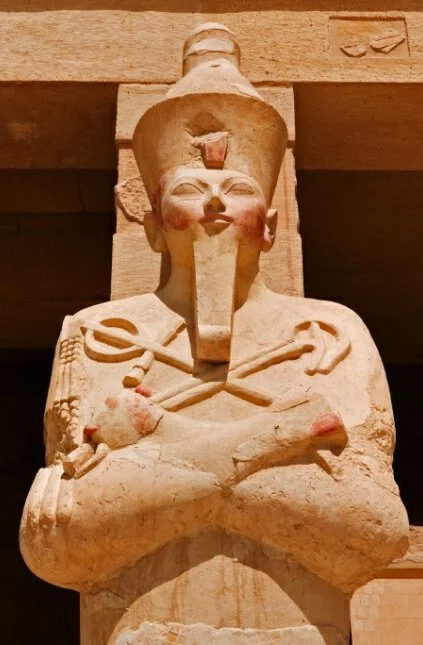Observing Our Origins: The Kemetic Fasting Period
It is not a secret
that human civilization finds its origins in Kemet. The builders of the Pyramids, writers of the Medu, keepers of the Temples, and followers of the Pharaohs, with their faces turned towards the Gods have provided the inspiration for all mankind to follow. We have yet to attain the heights reached by this great civilization. The capabilities of the culture that preserved the world for over 100,000 years has been the mystery that power hungry usurpers have been trying to solve since their first encounters with the kemmioo (People of Kemet). The inspiration that led humanity to its heights is humanity's ancestral Neter (God) WSR.
The end of fall and the beginning of winter are marked by religious and social observances. This is what we know in America as the "Holiday Season". The two most commonly celebrated holidays in the US are Thanksgiving and Christmas, with Hanukkah and Kwanzaa also celebrated by many during this time. It's interesting that this same time period also encompasses Kemetic Holy Days of major significance. The concepts presented with these Holy Days and their acknowledgment by the kemmioo provide inspiration for much of what we do today.
According to Kemetic traditions, WSR, our ancestral Neter, provided humanity with the education that we used to elevate ourselves from an animalistic state to the greatest heights of civilization. When humanity took the decision to strive to imitate the Divine World, it was WSR who gathered the 77 Commandments that we will have to follow to perfect ourselves. It is WSR who taught us agriculture, language, science and spirituality to uplift ourselves out of a barbaric lifestyle. It is through the observation of WSR and his family that we have defined our concepts of good, love, devotion, family values and right vs. wrong.
WSR was a Divine Being and like all Neteru (Gods) he was immortal. He was given a choice of how to express his immortality by the Neteru (Gods) who created him. WSR decided to live out his immortality through cycles of death and resurrection. We see that he is born, dies and reincarnates as we do, so we identify with him. WSR was killed by his brother Set, so we see the fragility of good in the face of evil. Every year, on the anniversary of his death, humanity mourns. We acknowledge how much he has given for us. As our ancestor, we see that it was his decision to die and resurrect that has opened the door for us to exist.
On the day of the death of WSR, kemmioo fast, from sun up until sundown, abstaining from food, water, sex, cursing and other vices as a gesture of sacrifice in acknowledgment of WSR. We show our appreciation for all he has done for us by spending the day in reflection about how his contributions have benefited our lives. On this day, we give thanks. It is interesting that in this year and others, the Death of WSR falls on the day of Thanksgiving.
This is not the only conspicuous correspondence this time of year. The 25th of December is commonly celebrated as the birthday of the Christian God, Jesus. Similar to WSR, Jesus is considered to be the savior of humanity who died for us. In fact, the title of WSR, Kerseshta - Keeper of Secrets - is remarkably close to the title for Jesus, Christ - the Anointed One.
Thirty seven days following the Death of WSR is the Embalment of WSR. This year, the Embalment of WSR takes place on the 2nd of January 2010. Forty days following the Death of WSR, the kemmioo begin a ten day fast. In doing this fast, we are accompanying WSR on his journey to the Imentet, which is the world where humans go when we die, to be judged. The closeness of these Holy Days to Christmas is also very interesting. This period also corresponds with the 7 day celebration of Kwanzaa.
The fast that we perform on these days is where other religions and social groups took the idea of fasting. Fasting is now done in observance of many religious holidays, such as Ramadan for Muslims, Lent for Christians and various days for Jewish and Hindu peoples. Lately, fasting has become a popular practice for health reasons as well.
It's important for us to study the origins of colonial society and the common practices we have adopted here. Everything has a history. If we want for ourselves something of higher quality than what we have received from this culture, let's tirelessly investigate the history of what we are doing and ultimately look to the culture that has led humanity to its greatest heights, the culture that is the inspiration for all other cultures.
This season, in our communities, let's realize that Kwanzaa was founded as a link for people who know nothing but colonialism to begin to look back to the ancestral cultures and values of humanity on the continent of Merita (Traditional Africa). Now that The Earth Center has reintroduced humanity's original culture, we do not need a substitute for our traditional Holy Days. Those who have observed Kwanzaa may see it as the stepping stone it was intended to be. Let us step forward andand strive for quality on this uphill journey to perfect ourselves. spend the days ahead in lamentation for humanity's ancestral Neter, WSR, and be inspired to renew our commitment.

